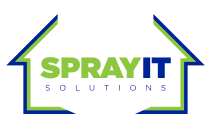Why Use
Spray Foam
Why Use Spray Foam
Boost Your Home’s Energy Rating
Combat Rising Energy Costs
Expanding the Subfloor Market
Spray Foam
Benefits

Superior Air Barrier Properties
Spray foam is able to block air leaks much more effectively than other types of insulation. Traditional insulation materials like rigid foam board, wool and fibreglass batts are not air tight. They allow air to move through the product and may slip out of place over time, which greatly increases the ability of outside air to penetrate the home. Polyurethane spray foam insulation fills the entire space, leaving fewer gaps for air leaks. This material is also denser than many other insulators, and provides a tight, impenetrable barrier to air infiltration and leaks.

Superior Insulation
When traditional R3.5 fiberglass batts are field installed using traditional methods, the result is an effective value of only R2.45. Much is lost in inexact fit, ineffective air barrier and broken vapour barrier. Oak Ridge National Laboratory confirms the labeled vs installed performance. (download the report) Polyurethane foam does not suffer from the installation challenges of traditional batts.

Increased Energy Efficiency
Air barrier sealing and a superior insulation material result in increased energy efficiency. This can mean a reduction in the use of heating or cooling systems, which can result in lower energy bills and fewer carbon emissions. A well insulated house may even allow you to choose smaller air conditioning and heating systems, which can save both money and space. Unlike traditional insulation, spray foam greatly reduces heat loss and gain through convection. This means that the R-values achieved in the lab is also achieved in your home. This is not the case with traditional insulation materials (for example batts) which only preform to their stated R-value in the lab. The R Fairy Tale explains this in more detail.

Never Sags or Breaks Down
Polyurethane Foam bonds to the surrounding substrates as it is installed. This bond holds the foam in place for the life of the building ensuring its effectiveness lasts offering ongoing savings.

Acoustic Benefits
Low density Polyurethane Foam Insulation has excellent sound absorption properties and sound transmission properties. When comparing polyurethane foam to other insulations, there is a very noteworthy difference. As an effective air seal, it eliminates the air gaps through which sound travels easiest. Low density polyurethane foam Insulation is superior in controlling mid-range frequencies that include the most common sounds, the human voice and stereo music.

Cost-Effective
While polyurethane spray foam insulation is generally more expensive than traditional insulation, it’s true cost may actually be much lower. Spray foam can serve as insulator, vapour barrier, and moisture barrier, (some of our foams are moisture vapour permeable) in some cases eliminating the need for most exterior caulking, building paper, and separate vapour barriers. In addition, the air tight properties and high R-values of spray foam means a greater reduction in energy bills for the life of the home.

Flexibility
The Spray Foam Insulation System
Discover the benefits of Spray Foam insulation systems, renowned for their superior performance and energy efficiency. Ideal for both residential and commercial applications, Spray Foam offers unmatched comfort and sustainability.
The Spray Foam Insulation System
Discover the benefits of Spray Foam insulation systems, renowned for their superior performance and energy efficiency. Ideal for both residential and commercial applications, Spray Foam offers unmatched comfort and sustainability.
